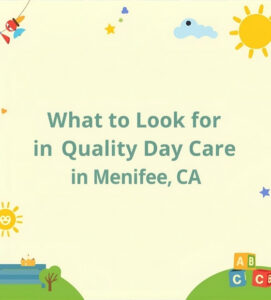Hey there, Menifee parents! If you’re scratching your head wondering what exactly day care is all about, you’re not alone. Let’s break it down in simple terms so you can figure out if it’s right for your family.
Understanding Day Care: Definition and Core Concepts
Day care is basically a place where your little ones get supervised care while you’re at work or handling other stuff. Think of it as a second home for your kids during the day. It’s not just babysitting – it’s way more than that.
What Does Day Care Actually Mean?
The daycare meaning is pretty straightforward. It’s professional child care that happens outside your home. Your child gets fed, plays, learns, and socializes with other kids their age. Most day cares run Monday through Friday, usually from early morning until evening.
Here’s what makes day care special:
- Trained caregivers watch your kids
- Kids learn through play and activities
- They make friends with other children
- You get peace of mind while you work
Day Care vs. Child Care vs. Preschool: Key Differences
Okay, let’s clear up the confusion. People throw these terms around like they’re the same thing, but they’re not.
When to Choose Day Care Over Other Options
Day care works best when you need full-day care for work. Preschool is usually just a few hours and focuses more on learning. Child care is the big umbrella term that covers everything.
Common Terminology Confusion Cleared Up
- Day care: Full-day care with some learning
- Preschool: Part-day educational program
- Child care: Any type of care for kids
- Nursery school: Another name for preschool
Why Day Care Matters in Today’s World
Let’s face it – most families need two incomes these days. Day care lets both parents work without worrying about their kids’ safety. Plus, kids get benefits they might not get at home, like learning to share and following routines.

Types of Day Care Services Available in Menifee
Menifee’s got tons of options. You just need to know what you’re looking for.
Center-Based Day Care
These are the big facilities you probably picture when someone says “day care.”
Licensed Child Care Centers
These places follow state rules and get regular inspections. They’ve got multiple rooms, playgrounds, and usually serve meals. Think of them as mini-schools for younger kids.
Non-Profit vs. For-Profit Centers
Non-profits might cost less because they’re not trying to make money. For-profit centers might have fancier stuff but cost more. Both can be great – it depends on what matters to you.
Corporate Day Care Chains
Companies like KinderCare and Bright Horizons have locations in Menifee. They’re consistent but might feel less personal than smaller places.
Family Day Care Homes
These happen in someone’s house. Usually, one person watches a small group of kids.
Small Group Settings
Your child gets more one-on-one attention. It’s less overwhelming for shy kids too.
Home-Like Environment Benefits
Kids feel more comfortable because it’s like being at a friend’s house. The caregiver can be more flexible with schedules and individual needs.
In-Home Day Care
This is when someone comes to your house to watch your kids.
Nanny Services
A nanny just focuses on your family. It’s pricier but super convenient – no packing diaper bags or driving anywhere.
Relative Care Arrangements
Grandma or your sister watches the kids. It’s often cheaper and you trust them completely. Just make sure everyone’s on the same page about rules and routines.
Specialized Day Care Programs
Some places have special focuses that might fit your family.
Montessori-Based Programs
Kids learn through hands-on activities and choose what interests them. It’s great for independent kids who like to explore.
Faith-Based Day Care
These include religious teachings and values. If faith is important to your family, this might be perfect.
Bilingual Programs
Your child learns in two languages. In Menifee’s diverse community, Spanish-English programs are pretty common.
Age Groups and Developmental Stages in Day Care
Day cares handle different ages differently. Here’s what to expect.
Infant Care (6 weeks – 12 months)
Babies need lots of attention and care.
What Infants Need from Day Care
- Diaper changes every 2-3 hours
- Bottle feeding on demand
- Safe places to sleep
- Gentle stimulation and talking
Safety Considerations for Babies
Look for cribs that meet safety standards, background-checked staff, and strict sick policies. Babies can’t tell you if something’s wrong, so the facility needs to be on top of everything.
Toddler Programs (1-3 years)
This is when kids start walking, talking, and getting into everything!
Developmental Milestones Focus
Toddlers learn to walk, run, and climb. Good programs have safe spaces for active play and help with language development.
Potty Training Support
Many day cares help with potty training. They work with your home routine so your toddler doesn’t get confused.
Preschool Age (3-5 years)
Kids this age are ready for more structured learning.
Kindergarten Preparation
They learn letters, numbers, and how to sit still for short periods. It’s like kindergarten practice.
Academic Readiness Skills
Things like holding a pencil, following directions, and raising their hand to ask questions.
School-Age Care (5-12 years)
For kids who are already in school but need somewhere to go before and after.
Before and After School Programs
Buses drop kids off at day care after school. They do homework, play, and wait for you to pick them up.
Summer Day Care Options
When school’s out, these programs keep kids busy with field trips, swimming, and fun activities.

Benefits of Day Care for Children’s Development
Your kid gets more than just supervision. They actually grow and learn in ways that might surprise you.
Social and Emotional Growth
This is huge. Kids learn to get along with others.
Peer Interaction Skills
They figure out how to share toys, take turns, and make friends. These skills help them throughout life.
Emotional Regulation Development
Kids learn it’s okay to feel mad but not okay to hit. Caregivers help them work through big feelings.
Building Independence
They learn to do things for themselves, like putting on shoes or cleaning up toys.
Cognitive and Academic Benefits
Day care isn’t just playtime – there’s real learning happening.
Early Learning Opportunities
Simple math through counting snacks, science through nature walks, and reading through story time.
Structured Educational Activities
Circle time, alphabet songs, and art projects that teach while kids have fun.
Language Development
Hearing other kids talk and singing songs helps language skills grow faster.
Physical Development Support
Kids need to move and day care gives them chances to do it safely.
Gross Motor Skill Activities
Running, jumping, and climbing on playgrounds builds big muscles and coordination.
Fine Motor Skill Practice
Coloring, playing with blocks, and using scissors gets little fingers ready for writing.
Health and Nutrition Education
Many programs teach about healthy foods and good hygiene habits.
Benefits of Day Care for Menifee Parents
Let’s be honest – you need benefits too!
Work-Life Balance Support
Day care makes it possible to have a career and a family.
Reliable Child Supervision
You don’t have to call in sick when your babysitter cancels. Day care is there Monday through Friday.
Flexible Scheduling Options
Some places offer part-time care or extended hours for parents with unusual work schedules.
Peace of Mind Benefits
Knowing your child is safe and happy makes work less stressful.
Professional Caregiving
These folks are trained to handle everything from diaper blowouts to toddler meltdowns.
Emergency Backup Care
If your regular babysitter gets sick, day care is still open.
Community Connection
You’ll meet other parents going through the same stuff you are.
Parent Networking Opportunities
Pickup time conversations turn into playdates and friendships.
Local Family Support Systems
Other parents become your go-to people for recommendations and advice about living in Menifee.
Day Care Costs and Financial Considerations in Menifee
Let’s talk money. Day care isn’t cheap, but there are ways to make it work.
Average Day Care Costs in Menifee
Prices vary a lot based on what you choose.
Infant Care Pricing
Babies need more attention, so infant care costs the most. Expect $300-500 per week in Menifee.
Toddler and Preschool Rates
These drop a bit as kids get older. Think $250-400 per week.
Part-Time vs. Full-Time Options
Part-time can save money if your schedule allows it. Some places offer 3-day programs.
Financial Assistance Programs
Don’t assume you can’t afford it. Help might be available.
California State Subsidies
If you qualify based on income, the state might pay part of your day care costs.
Employer-Sponsored Benefits
Some Menifee employers offer day care assistance or flexible spending accounts for child care.
Tax Credits and Deductions
You can usually deduct day care costs on your taxes. Keep those receipts!
Budgeting for Day Care Expenses
Plan ahead so the costs don’t surprise you.
Hidden Costs to Consider
- Registration fees
- Supply fees
- Late pickup charges
- Field trip costs
Ways to Reduce Day Care Expenses
- Ask about sibling discounts
- Look into co-op programs
- Consider family day care instead of centers
- Check if relatives qualify for state assistance to watch your kids
California Day Care Regulations and Licensing
California has rules to keep kids safe. Here’s what you should know.
State Licensing Requirements
Licensed facilities follow strict rules and get inspected regularly.
What Licensed Day Care Means
The state checks that the place is safe, clean, and follows rules about things like how many kids each caregiver can watch.
Inspection and Compliance Standards
Inspectors show up unannounced to make sure everything’s up to code. You can usually see inspection reports online.
Staff Qualifications and Training
Not just anyone can work at a licensed day care.
Caregiver Education Requirements
Most need some early childhood education or experience working with kids.
Background Check Processes
Everyone who works around kids gets fingerprinted and background checked. No exceptions.
Health and Safety Standards
These rules exist for good reasons.
Facility Safety Requirements
Things like outlet covers, secure gates, and safe playground equipment.
Emergency Preparedness Protocols
Plans for fires, earthquakes, and medical emergencies. Staff practice these regularly.
Staff-to-Child Ratios
This is super important for your child’s safety and attention.
Age-Specific Ratio Requirements
- Infants: 1 caregiver for every 4 babies
- Toddlers: 1 caregiver for every 6-8 toddlers
- Preschoolers: 1 caregiver for every 12 kids
Why Ratios Matter for Quality Care
Too many kids per caregiver means less attention for your child and higher chance of accidents.
What to Expect from Quality Day Care
Good day cares have certain things in common. Here’s what to look for.
Daily Routines and Schedules
Kids thrive on routine. Quality places have consistent daily schedules.
Typical Day Structure
- Morning free play as kids arrive
- Circle time or group activity
- Snack time
- Outdoor play
- Lunch
- Nap time (for younger kids)
- Afternoon activities
- Pickup time
Meal and Snack Times
Many provide meals and snacks. Ask about their menu and whether they accommodate food allergies.
Nap and Rest Periods
Younger kids usually nap after lunch. Older kids might have quiet time instead.
Educational Activities and Curriculum
It’s not all just playing – there’s purposeful learning happening.
Age-Appropriate Learning Activities
Activities match what kids can handle. No forcing 2-year-olds to sit still for long lessons.
Play-Based Learning Approach
Kids learn through play. Building blocks teach math, dress-up teaches social skills.
Creative Arts and Crafts
Painting, coloring, and crafts help creativity and fine motor skills.
Communication with Parents
Good day cares keep you in the loop about your child’s day.
Daily Reports and Updates
Many places give you a daily sheet about what your child ate, when they napped, and what they did.
Parent-Teacher Conferences
Regular check-ins about your child’s development and any concerns.
Digital Communication Tools
Some use apps where caregivers can send photos and updates throughout the day.
How to Choose the Right Day Care in Menifee
This is the big decision. Take your time and do your homework.
Researching Day Care Options
Start your search online but don’t stop there.
Online Resources and Directories
Check out websites like Care.com or the California Department of Social Services website for licensed providers.
Local Referral Services
Riverside County has resources to help you find child care options.
Parent Reviews and Recommendations
Ask other Menifee parents where they send their kids. Personal recommendations are gold.
Essential Questions to Ask Providers
Don’t be shy about asking lots of questions.
Program and Philosophy Questions
- What’s your daily schedule like?
- How do you handle discipline?
- What’s your sick policy?
- How do you communicate with parents?
Safety and Health Policy Inquiries
- Are you licensed?
- What’s your emergency plan?
- How do you handle allergies?
- Can I see your recent inspection reports?
Cost and Contract Questions
- What’s included in the fee?
- Are there extra costs?
- What’s your vacation policy?
- How much notice do you need if I want to withdraw?
Red Flags to Watch For
Trust your gut. If something feels off, it probably is.
Unlicensed Facilities
Unless you’re choosing family care on purpose, stick with licensed places.
High Staff Turnover
If kids are constantly saying goodbye to caregivers, that’s not good for their emotional development.
Poor Communication Practices
If they can’t return your calls or answer basic questions, how will they handle your child?
Making Facility Visits
Always visit before deciding. Here’s what to look for.
What to Observe During Visits
- Are kids happy and engaged?
- Is the place clean and organized?
- How do caregivers interact with children?
- Are safety measures in place?
Meeting Staff and Caregivers
The people matter more than the fancy equipment. Do they seem to genuinely like kids?
Checking Facilities and Equipment
Look for age-appropriate toys, clean bathrooms, and secure outdoor areas.
Preparing Your Child for Day Care
Starting day care is a big change. Help your child get ready.
Emotional Preparation Strategies
Your attitude matters. If you’re nervous, your child will pick up on it.
Talking About Day Care Positively
“You’re going to make new friends and play fun games!” sounds better than “Mommy has to go to work.”
Practice Separation Activities
Start with short separations at home. Leave them with a trusted relative for an hour or two.
Building Excitement for New Friends
Read books about starting day care or making friends. Talk about all the fun things they’ll do.
Practical Preparation Steps
Get the logistics sorted out ahead of time.
Establishing Routines at Home
If day care starts at 7 AM, start practicing that wake-up time a few weeks early.
What to Pack for Day Care
- Diapers and wipes (if needed)
- Change of clothes
- Comfort item like a stuffed animal
- Any medications
- Food if the facility doesn’t provide it
Labeling Personal Items
Put your child’s name on everything. Seriously, everything. Kids lose stuff constantly.
Transition Timeline and Tips
Ease into it instead of jumping in cold turkey.
Gradual Introduction Process
Many places let you visit a few times before starting. Some allow shorter days the first week.
First Week Expectations
Expect tears – from both of you! The first week is tough, but most kids adjust quickly.
Handling Separation Anxiety
Keep goodbyes short and sweet. Don’t sneak out – that makes kids not trust you.
Common Day Care Concerns and Misconceptions
Let’s address the worries that keep parents up at night.
Addressing Parent Fears
Every parent has these fears. You’re not alone.
“Day Care Makes Kids Sick More Often”
Yeah, they might get more colds at first. But they’re building immunity that helps them later. Most kids adjust after a few months.
“Day Care Children Are More Aggressive”
Kids in day care learn to stand up for themselves, which some people mistake for aggression. Good programs teach kids how to handle conflicts appropriately.
“Home Care is Always Better”
Not necessarily. It depends on the quality of care and what your child needs. Some kids thrive with the structure and socialization of day care.
The Hardest Age to Start Day Care
There’s no perfect age, but some times are easier than others.
Infant vs. Toddler Start Times
Infants adapt easily because they don’t know any different. Toddlers might have a harder time because they’re more aware of the change.
Adjusting Expectations by Age
Older kids might take longer to adjust because they have to unlearn routines and make new friends.
Potential Drawbacks to Consider
Day care isn’t perfect. Here are the downsides.
Exposure to Illness
More kids means more germs. That’s just reality.
Less Individual Attention
Your child won’t get as much one-on-one time as they would with a nanny or grandparent.
Behavioral Challenges
Some kids pick up behaviors from other kids that you might not love.
Local Menifee Day Care Resources
Menifee has lots of resources to help you find good child care.
Finding Licensed Providers in Menifee
Start with official sources to make sure places are legitimate.
California Department of Social Services Database
Search online for licensed providers in your zip code. You can see inspection reports too.
Riverside County Resources
The county has a child care resource and referral program that’s free to use.
Local Child Care Resource Centers
Places like the Riverside County Office of Education can help you navigate your options.
Menifee-Specific Support Services
The city and local organizations offer help too.
City Programs and Initiatives
Check the Menifee city website for any child care programs or resources they offer.
Community Organizations
Places like the YMCA sometimes have day care or after-school programs.
Parent Support Groups
Look for local parenting groups on social media or through community centers.
Emergency and Backup Care Options
For when your regular day care closes or your child’s too sick to go.
Drop-In Day Care Centers
Some places take kids by the day without long-term contracts.
Babysitting Cooperatives
Groups of parents take turns watching each other’s kids.
Extended Family Networks
Sometimes grandparents or other relatives can fill in during emergencies.
Day Care Alternatives for Menifee Families
Day care isn’t the only option. Here are some alternatives.
In-Home Care Options
Having someone come to your house might work better for some families.
Hiring a Nanny
Expensive but convenient. Your child stays home and gets individual attention.
Au Pair Programs
Young people from other countries live with you and provide child care in exchange for room, board, and a small salary.
Relative Care Arrangements
Having grandparents or other family members watch your child can work great if everyone’s on the same page.
Parent Cooperatives
Parents work together to provide child care.
How Co-ops Work
Parents take turns watching a group of kids. You might watch 8 kids one day a week instead of paying for day care every day.
Starting a Parent Co-op
Get together with other parents and figure out schedules, rules, and backup plans.
Part-Time Solutions
If you don’t need full-time care, these might work.
Preschool with Extended Care
Some preschools offer before and after care for working parents.
Mother’s Day Out Programs
Usually run by churches, these give parents a few hours of break each week.
Playgroups and Activities
Organized activities where parents stay but kids get socialization.
Frequently Asked Questions About Day Care
Here are the questions every parent asks.
Age and Timing Questions
What’s the youngest age for day care?
Most centers take babies as young as 6 weeks old. Some family day cares might take younger infants.
Should day care come before kindergarten?
It’s not required, but many kids benefit from the structure and social skills they learn in day care.
How early should I start looking?
Start looking when you’re pregnant or at least 3-6 months before you need care. Good places often have waiting lists.
Health and Safety FAQs
How do day cares handle sick children?
Most have strict policies about fever, vomiting, and contagious illnesses. Sick kids usually can’t return until they’ve been fever-free for 24 hours.
What safety measures should I expect?
Locked doors, secure playgrounds, first aid trained staff, and emergency plans.
How are emergencies handled?
Licensed facilities must have written emergency plans and practice drills regularly.
Cost and Contract Questions
What’s included in day care fees?
Usually basic care, meals, and activities. Ask about extra costs for diapers, field trips, or supplies.
How do payment schedules work?
Most require weekly or monthly payment in advance. Some offer discounts for paying annually.
What happens if I need to withdraw?
Check the contract for notice requirements. You might lose deposits or have to pay for a certain period.
Making the Day Care Decision: Is It Right for Your Menifee Family?
Only you can decide what’s best for your family.
Evaluating Your Family’s Needs
Think about your specific situation.
Work Schedule Considerations
Do you work standard hours or need flexible care? Some jobs require more flexibility than others.
Child’s Personality and Needs
Outgoing kids might love day care’s social aspect. Shy kids might do better in smaller settings.
Financial Readiness Assessment
Can you afford it without major stress? Factor in all the costs, not just tuition.
Signs Day Care Might Be the Right Choice
When Social Interaction is Needed
If your child is around adults all day, they might benefit from playing with other kids.
For Working Parent Support
If you need reliable care so you can work, day care provides that consistency.
Educational Development Goals
Day care can give your child a head start on academic and social skills.
Taking the Next Steps
Ready to move forward? Here’s what to do.
Creating Your Day Care Search Plan
Make a list of must-haves vs. nice-to-haves. Set up visits to your top choices.
Building Your Support Network
Connect with other parents who’ve been through this. They’re your best resource.
Preparing for the Transition
Start getting your child ready emotionally and practically for this big change.
Conclusion: Empowering Menifee Parents with Day Care Knowledge
Choosing day care is a big decision, but you don’t have to figure it out alone.
Key Takeaways for Parents
- Day care can benefit both you and your child
- Licensed facilities follow safety rules and get inspected
- Every family’s needs are different – what works for others might not work for you
- It’s okay to take time to find the right fit
Your Next Action Steps
- Start researching options in Menifee
- Visit your top choices
- Ask lots of questions
- Trust your instincts
Local Resources Summary
Remember, Menifee has lots of resources to help you:
- Riverside County child care referral services
- California licensing database
- Local parent groups and recommendations
You’ve got this! Finding the right day care takes time, but it’s worth it when you find a place where your child is happy and you have peace of mind.



